Brother Rat and a Baby

Brief Synopsis
Cast & Crew
Ray Enright
Priscilla Lane
Wayne Morris
Jane Bryan
Eddie Albert
Jane Wyman
Film Details
Technical Specs

Synopsis
Two years after graduating from the Virginia Military Institute, Bing Edwards is being considered for the job of head coach at his alma mater. Because his father is on the hiring committee, the fast-talking, free-spending Billy Randolph is certain that he can win his old friend Bing the job and, consequently, summons Bing, his wife Kate and son Commencement to New York. They are to stay with Kate's uncle, John Harper, the wealthy owner of International Airways. Bing arrives just as Uncle John is leaving on a business trip for Washington D.C., and he gives Bing money to pay for a C.O.D. package, which he asks Bing to send to Washington. Bing has come without his wife and son because Commencement swallowed a diamond ring on the trip and is being detained until he "returns" the ring. Billy talks Bing into using the C.O.D. money to pay for the ring, only to discover later that the ring is worthless and they can not get their money back. Next, Billy hocks Uncle John's priceless Stradivarius violin to pay for the cab ride after a night out on the town with his sweetheart, Joyce Winfree, and his old roommate, Dan Crawford, and his girl friend, Claire Terry. Billy then loses Bing the coaching job by sending fake telegrams to the hiring committee, endorsing Bing for the job. Misfortune visits Dan when Commencement destroys some illustrations and he is fired from his job. A relentless Billy comes to their rescue by selling Joan's ticket to Hawaii to pay for the C.O.D. package and the violin. Just as all their problems seem resolved, Commencement breaks Uncle John's priceless ship's model, Claire's father orders her home, and Commencement sets fire to the Harpers' apartment. When all seems lost, Billy stows Commencement aboard Uncle John's new Peru-bound plane as a goodwill gesture, and the resulting publicity wins them all a job at the airline.

Director
Ray Enright
Cast

Priscilla Lane

Wayne Morris

Jane Bryan

Eddie Albert
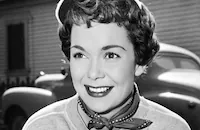
Jane Wyman
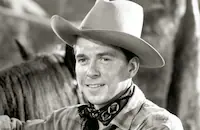
Ronald Reagan
Peter B. Good

Larry Williams
Jessie Busley

Paul Harvey
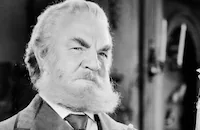
Berton Churchill

Nana Bryant

Arthur Treacher
Ed Gargan

Mayo Methot

Moroni Olsen
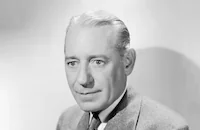
Henry O'neill
Billy Wayne

Irving Bacon
Carlyle Moore Jr.
Richard Clayton

Alan Ladd
Dave Willock
Sally Sage
Tommy Bupp
Douglas Meins
Harlan Briggs
Eddy Chandler
Wade Boteler
William Gould
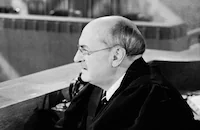
Granville Bates
Claude Wisberg
Michael Conroy
John Harron
George Sorel
Jeffrey Sayre

Emmett Vogan
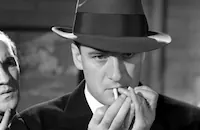
Elliott Sullivan
John Dilson
Cliff Clark
Ed Parker
John Deering
Ted Osborn

John Hamilton
Crew
Milo Anderson
Earl Baldwin
Hugh Cummings
Fred F. Finklehoffe
Leo F. Forbstein
Robert Haas
Byron Haskin
Ray Heindorf
Jesse Hibbs
Stanley Jones
Clarence Kolster
Robert Lord
Richard Macaulay
John Monks Jr.
Heinz Roemheld
Charles Rosher
Russell Saunders
Willard Van Enger
Jerry Wald
Jack L. Warner
Perc Westmore

Film Details
Technical Specs

Articles
Brother Rat and a Baby
Despite the adorable kid and the participation of most of the original team, Brother Rat and a Baby proved to be a disappointment with the public and critics alike. The film was deemed to be second-rate quality screwball comedy, which was no doubt indicative of the speed with which Warners put the film into production.
Brother Rat and a Baby marked the second of four pictures that Jane Wyman made with the future President of the United States. She and Reagan actually started dating during the making of Brother Rat. The romance definitely continued through the making of the sequel, but historical sources are mixed as to when they were engaged. One Reagan biographer says that they were engaged shortly after the completion of Brother Rat, while Jane Wyman's biographers, Joe Morella and Edward Epstein, reveal a different story: "According to Wyman, 'We were about to be called for a take (during Brother Rat and a Baby). Ronnie simply turned to me as if the idea were brand-new and had just hit him and said, 'Jane, why don't we get married?' I couldn't think of any reason why we shouldn't...I was just about to say a definite yes when we were called before the cameras. In trying to step down off my own personal cloud, I managed to muff a few lines and toss in a whispered 'Yes' after the director said 'Cut!'" The couple were married on January 26, 1940.
Director: Ray Enright
Screenplay: John Monks, Jr., Fred F. Finklehoffe (original screenplay); Earl Baldwin (dialogue and screenplay, uncredited); Richard Macaulay, Jerry Wald (both uncredited)
Cinematography: Charles Rosher
Art Direction: Robert Haas
Music: H. Roemheld; Howard Jackson (uncredited)
Film Editing: Clarence Kolster
Cast: Priscilla Lane (Joyce Winfree), Wayne Morris (Billy Randolph), Jane Bryan (Kate Edwards), Eddie Albert ('Bing' Edwards), Jane Wyman (Claire Terry), Ronald Reagan (Dan Crawford), Peter B. Good (Commencement Edwards), Arthur Treacher (Snelling, Harper's Butler), Moroni Olsen (Major Robert Terry), Jessie Busley (Mrs. 'Gram' Brooks).
BW-87m. Closed captioning.
by Scott McGee

Brother Rat and a Baby
Eddie Albert (1906-2005)
The son of a real estate agent, Albert was born Edward Albert Heimberger in Rock Island, Ill., on April 22, 1906. His family relocated to Minneapolis when he was still an infant. Long entralled by theatre, he studied drama at the University of Minnesota. After years of developing his acting chops in touring companies, summer stock and a stint with a Mexican circus, he signed a contract with Warner Bros. and made his film debut in Brother Rat (1938). Although hardly a stellar early film career, he made some pleasant B-pictures, playing slap happy youths in Brother Rat and a Baby (1940), and The Wagons Roll at Night (1941).
His career was interrupted for military service for World War II, and after his stint (1942-45), he came back and developed a stronger, more mature screen image: Smash-Up: The Story of a Woman (1947); Carrie (1952); his Oscar® nominated turn as the Bohemian photographer friend of Gregory Peck in Roman Holiday (1953); a charming Ali Hakim in Oklahoma (1955); and to many critics, his finest hour as an actor, when he was cast unnervingly against type as a cowardly military officer whose lack of commitment to his troops results in their deaths in Attack! (1956).
As he settled into middle-age, Albert discovered belated fame when he made the move to Hooterville. For six seasons (1965-71), television viewers loved Eddie Albert as Oliver Wendal Douglas, the bemused city slicker who, along with his charming wife Lisa (Eva Gabor), takes a chance on buying a farm in the country and dealing with all the strange characters that come along their way. Of course, I'm talking about Green Acres. If he did nothing else, Alberts proved he could be a stalwart straight man in the most inane situations, and pull it off with grace.
After the run of Green Acres, Albert found two of his best roles in the late stages of his career that once again cast him against his genial, good-natured persona: the fiercly overprotective father of Cybill Shepherd in The Heartbreak Kid (1972), for which he earned his second Oscar® nomination; and the sadistic warden in Robert Aldrich's raucous gridiron comedy The Longest Yard (1974). Soon, Albert was in demand again, and he had another hit series, playing a retired police officer who partners with a retired con artist (Robert Wagner) to form a detective agency in Switch (1975-78).
The good roles slowed down slightly by the dawn of the '80s, both film: The Concorde: Airport '79 (1979), How to Beat the High Co$t of Living (1980), Take This Job and Shove It (1981); and television: Highway to Heaven, Murder, She Wrote, Thirtysomething, offered him little in the way of expansion. Yet, Albert spent his golden years in a most admirable fashion, he became something of activist for world health and pollution issues throughout the latter stages of his life. It is widely acknowledged that International Earth Day (April 22) is honored on his birthday for his tireless work on environemental matters. Albert was married to famed hispanic actress Margo (1945-85) until her death, and is survived by his son, actor Edward Albert, a daughter, and two granddaughters.
by Michael T. Toole
Eddie Albert (1906-2005)
Ronald Reagan, 1911-2004 - TCM Remembers Ronald Reagan
Ronald Reagan, the actor turned elected official whose fascinating career saw him develop as a contract player for Warner Brothers studios, to a politician who fulfilled his ambitions by becoming the 40th President of the United States, died at his home in Los Angeles on June 5 after a long battle with Alzheimer's disease. He was 93.
He was born Ronald Wilson Reagan on February 6, 1911 in Tampico, Illinois to John and Nelle Reagan. When Reagan was nine, his family settled down in the small community of Dixon, about 100 miles west of Chicago. After high school, Reagan enrolled in Eureka College, a small Christian school near Peoria. He graduated in 1932 with a degree in Economics, and pursued a career in broadcasting. His first gig was as a part-time announcer at WOC in Davenport, Iowa. Within a year, WOC had merged with its big-sister station, WHO in Des Moines, and Reagan was hired as a sports announcer.
In the spring of 1937, Reagan drove to Southern California to catch the Chicago Cubs in spring training on Santa Catalina Island. While he was in California, he wrangled a screen test and signed a contract for $200 a week with Warner Brothers. His film debut was rather inauspicious; he portrayed a radio announcer in an innocuous comedy Love is on the Air (1937). He made a few more "B" programmers like Hollywood Hotel (also 1937), and Girls on Probation (1938), before getting his first prominent role opposite Bette Davis in the popular tearjerker, Dark Victory (1939).
Although he seldom got credit for being a good actor, there was no denying that Reagan held his own given the right material: Knute Rockne, All American as the doomed Notre Dame football hero George "The Gipper" Gipp, where he delivered the film's immortal line "Win one for the Gipper!"; Santa Fe Trail in which he ably supports Errol Flynn in one of the boxoffice hits of its era (both 1940); Kings Row (1941), featuring one of his finest performances as a small-town playboy whose legs are amputated by a careless surgeon; and Desperate Journey (1942) where he again supported Flynn in an exciting action picture.
Due to his poor eyesight, Reagan didn't see any action in World War II, so the studio heads assigned him to star in a series of patriotic films produced by the First Motion Picture Unit of the Army Air Forces in Culver City. Between 1942-45, Reagan starred in over 400 of these films. After the war, Reagan still found some good roles: The Voice of the Turtle (1947) proved he had a deft hand at light comedy opposite Eleanor Parker; The Hasty Heart (1949) offered another underrated performance as he ably portrayed the Yank in John Patrick's much heralded wartime play; and Storm Warning (1950) was a slick melodrama that cast Reagan as a crusading District Attorney determined to bring the KKK in a small southern town, with the help of Doris Day and Ginger Rogers!
It was around this time that Reagan became involved in politics. In 1947, he began a five-year term as president of the Screen Actors Guild (SAG), and testified in October of that year before the newly formed House Un-American Activities Committee (HUAC). He identified suspected Communists Larry Parks, Howard Da Silva and Alexander Knox, all of whom were subsequently called to testify, and subsequently blacklisted. Later records showed Reagan was so concerned about the Communist influence in Hollywood, that he became an FBI informer.
As Reagan became steeped in his political career, his parts throughout the '50s became inferior: the notorious Bedtime for Bonzo (1951); the coy "sex" comedy She's Working Her Way Through College (1952) that cast him as a college professor who romances a stripper! (Virginia Mayo); Cattle Queen of Montana (1955), a sluggish Western that even the redoubtable Barbara Stanwyck couldn't save; and finally Hellcats of the Navy (1957), a stodgy war picture that would be his only film that co-starred his wife Nancy (Davis).
Television offered some salvation. For eight years, (1954-62), Reagan served as the host of General Electric Theater, a televised series of dramas. He also found a niche as GE's goodwill ambassador to employees and to civic and business groups around the country, furthering his taste and honing his craft as a public official. By the mid '60s, Reagan would move into politics entirely, save for one last film, the thrilling The Killers (1964), Reagan's only known villainous role, as a murderous gangster. That same year, he actively campaigned for Republican Presidential candidate Barry Goldwater, although Goldwater lost to Lyndon B. Johnson.
Reagan whose profile was riding high, had cemented his future as a successful politician. In 1966, he ran against incumbent Governor Pat Brown for the state of California and won, serving successfully for two terms until 1974.
Reagan began an all-out, two-year drive to wrest the 1976 nomination from incumbent Gerald R. Ford, an appointed vice president who became president on the resignation of Nixon. Reagan fell short by a handful of delegates to the Republican national convention. But Ford lost to Jimmy Carter, and Reagan became the front-runner to challenge Carter in 1980. After defeating Carter, Reagan held two terms as President of the United States (1981-89). After his second term was over, he retired quietly in California. In 1994, it was revealed to the media that Reagan was suffering from Alzheimer's disease; he had been kept out of the public eye since then.
He was married briefly to actress Jane Wyman (1940-48), and had two children; a daughter Maureen and an adopted son, Michael. In 1952, he married a budding film starlet, Nancy Davis, who bore him two more children; a daughter, Patty; and a son, Ronald Jr. Ronald Reagan is survived by Nancy, Michael, Patty and Ron Jr. His daughter Maureen died of Melanoma in 2001 at the age of 60.
by Michael T. Toole
Ronald Reagan, 1911-2004 - TCM Remembers Ronald Reagan
Quotes
Trivia
Notes
This picture was a sequel to Warner Bros. 1938 picture Brother Rat. Several of the character names cited by the Variety review differ from those found on the film and other sources. Although the onscreen credits attribute original screenplay to John Monks and Fred Finklehoffe, the Daily Variety review credits Jerry Wald and Richard Macaulay with screenplay.

Miscellaneous Notes
b&w















